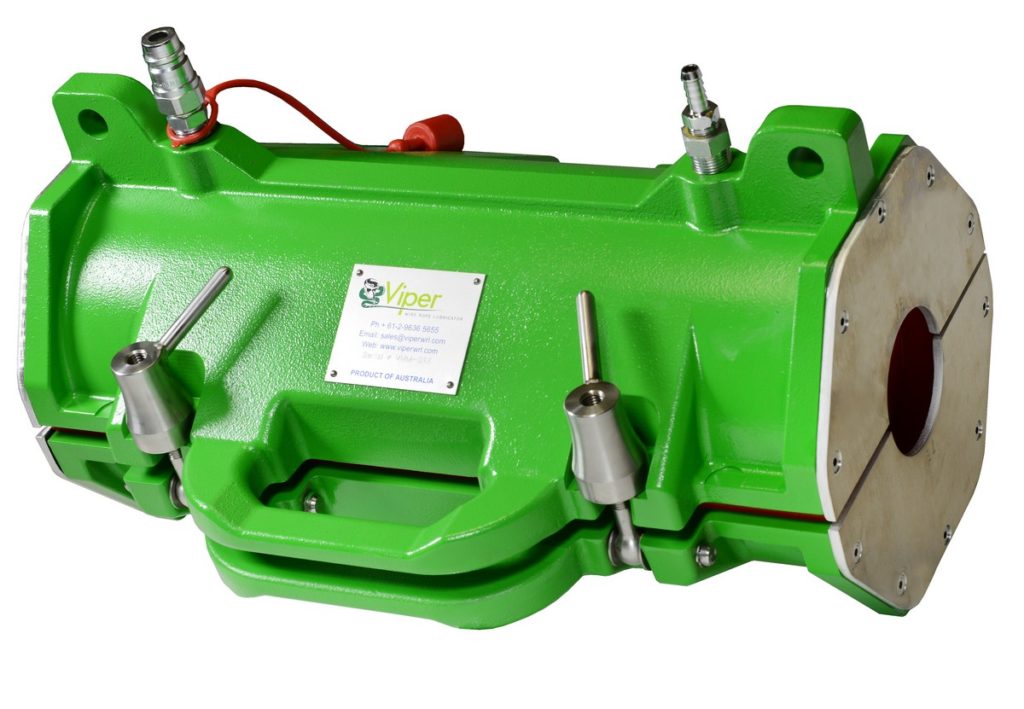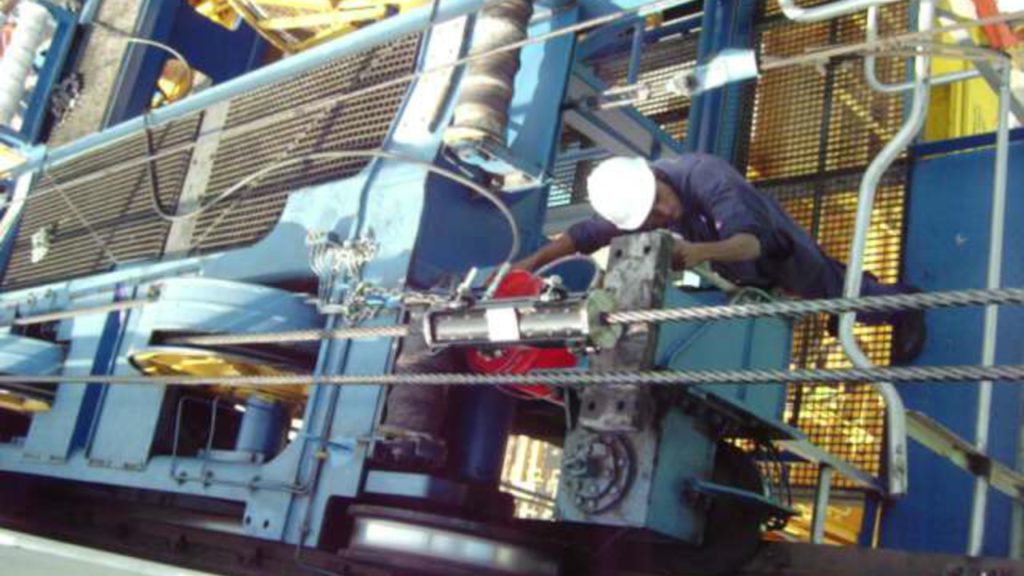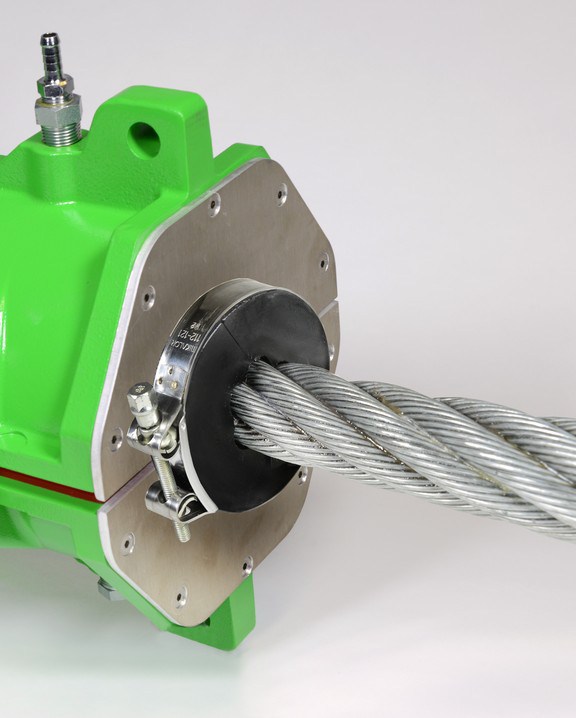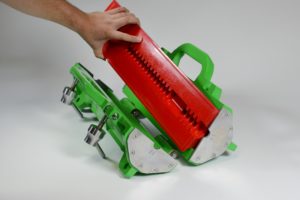Wire rope lubricants are an essential part of wire rope maintenance, giving a greater operational life to the rope, along with added safety, minimised operational risk, and increased productivity of the equipment. In order for the wire rope grease to support the rope properly, effective lubrication is essential. This will coat the wires of the rope in a protective, wear-reducing barrier.
Wire ropes typically fail from internal wire breakage, external corrosion, bending fatigue, accidental damage, and excessive strain. One of the most effective methods of mitigating this damage is by ensuring true penetration of wire rope lubrication using the Viper Wire Rope Lubrication MKII Series.

What Affects WiRE ROPE Penetration?
One of the main differences between using a lubricator system vs manual (by hand) application is the grease’s ability to penetrate your wire rope. With a lubricator, grease is spread evenly and allows for deeper rope penetration.
factors that negatively impact penetration effectiveneSS
- The construction of the rope
Not all wire ropes are made the same, and the construction of each will influence how the lubrication responds and penetrates. Some of the most difficult ropes to penetrate include plastic impregnated rope, compacted wire ropes, non-rotational wire ropes, and armoured ropes. This is often due to the materials of the rope, the groove pattern, and the strand density.
- Contamination on the rope strands
If there is contamination on the wire ropes, even a high quality lubricant will not form an effective bond with the rope strands and little to no penetration will occur. Some of the most common types of contamination on wire ropes include old and low-grade lubricant, mud build-up, and residual such as coal dust and grain.
- The lubricant used
The lubricant that you use for your wire ropes needs to be suitable for the application. Some products, such as rope dressing or coating lubricants will have very little penetrating ability and simply won’t achieve the desired result of proper lubrication. The thickness of the lubricant and how well it flows will largely influence how well it can penetrate towards the core of the wire rope. We write more about this in our blog Wire Rope Lubricant for Specific Applications.
- The tension of the wire rope
Wire ropes are used for a wide range of applications, often lifting, suspending, and hoisting extremely heavy loads. The way the wire rope is used in its day-to-day life can impact the lubricant’s ability to penetrate. If the rope is under high tension, proper wire rope lubrication is much more achievable through an automatic lubrication system.
How to Gain Optimum Penetration into Rope
Nobody wants to waste time, money, and manpower by applying a product that won’t do its job properly. Despite using a good lubricant and applying it regularly, your wire ropes may still be at risk if the following factors aren’t considered, limiting the penetration ability of the lubricant.
Correct Seal Selection
The seal is one of the main contributing factors of the automatic wire rope lubrication system and its important to note that not all seals in different automatic wire rope lubrication systems are the same.
The Viper WRL seals have a larger contact area with the rope, allowing increased dwell time between the rope and the seal which provides an increased opportunity for the lubricant to be massaged into the rope structure.
Selecting the correct size seal for your automatic wire rope lubrication system is vital in ensuring effective lubrication of your wire rope. This is why Viper WRL has developed the easy to use Viper Seal Selection Guide for the Viper Wire Rope Lubricators.
The Viper seal is made from Polyurethane with high abrasion resistance properties, meaning it is resistant to wear. This enables the seal to be used to lubricate thousands of meters of rope without being replaced.
Prepare With Rope Cleaning
As mentioned previously, contamination such as old lubricant on the wire ropes can be counterproductive for lubricant penetration. Proper wire rope cleaning can effectively remove old lubricants and foreign contamination to improve the penetration of wire rope grease.
Furthermore, Viper wire rope cleaners can prepare your rope to receive the full impact of the new lubricant while reducing the wear on the ropes and sheaves.
USe a Viper WRL Lubricator
Viper WRL’s lubrication systems can provide fast and effective lubrication if correctly installed and appropriately used.
The air supply is an essential aspect of your wire rope lubricator and should be set accordingly to the correct PSI to allow proper operation.
The Viper lubricator collar is secured with nylon ratchet straps and bow shackles which should be kept in high tension and strain during operation. This will help the lubricator collar to move laterally during operation to allow for even wire rope spooling and lubrication.
Get the Most From Your Lubricant
Regular application of a high-quality penetrating lubricant is an essential aspect of wire rope preventative maintenance. Nothing beats the combination of the right lubricant with Viper’s WRL MKII system after a good clean with our wire rope cleaners.
Lubricant is a wire rope’s best friend, allowing it to move freely, reducing fatigue and softening shock during operation. When applied properly, lubricant can prolong corrosion and give the rope a longer, more functional working life. If you’ve talked with a wire rope lubricant specialist, you’re likely to know about these key factors already.
The Viper WRL MKII ensures the lubricant can penetrate deep into your rope, working its way into either the steel or fibre rope core. This keeps the lubricant in place, ensuring it clings tightly to the rope.
By following the guidelines set out in this blog, you will be ensuring the penetration of your lubricant is as effective as it should be. For more information on how any of our products, whether it’s our range of lubricants, our wire rope cleaners, or the Viper WRL MKII itself- contact our friendly and knowledgeable Viper WRL team here.

Frequently Asked Questions about Rope lubrication
Should you lubricate wire ropes?
The short answer is – yes! Like anything used for industrial applications, regular maintenance is key to giving it a safe and functional life. Lubricating wire ropes can help to prevent corrosion, reduce friction and increase wear resistance.
What is the most common abuse of wire rope leading to failure?
Poor lubrication is the root of many issues that lead to rope failure. Human error is a risk on any worksite, and overloading, twisting or poor storage are some common abuses of wire ropes that result in their failure, along with corrosion, fatigue, and abrasive wear.
What factors affect the strength of wire rope?
Wire ropes fail for a number of reasons that are preventable with proper lubrication, including internal and external corrosion, fatigue from bending, external wear of wire strands, accidental damage, and excessive strain.
What is the reason for lubricating wire rope?
Lubricating wire ropes will aid in preventing corrosion and premature wear, while giving the rope greater flexibility and shock protection to aid in twisting, lifting, and holding high tension loads.
How can lubricants protect cabling and wires from surface damages?
Lubricants can protect the wire rope from surface damage by sealing the surfaces against rust and shielding against corrosion. Additionally, lubricant can protect the rope from itself, giving it a smoother glide over surfaces, cable drums, and sheaves.



